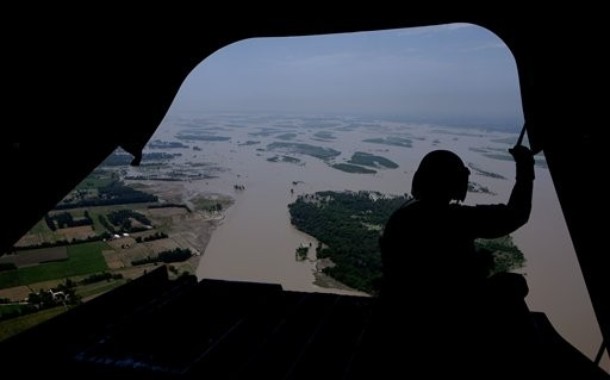
As my colleague Shuja Nawaz has eloquently argued, massive American aid to help Pakistan recover from the humanitarian disaster of the recent flooding "may help improve America’s image among a population that generally resents the United States." But the converse is true, too: doing too little will bolster the Taliban.
The editors of the Berliner Zeitung put it most bluntly:
The Taliban is a major beneficiary from the West’s response to the Pakistan floods. The country really should be getting generous support and it should be coming quickly, but so far, the accounts of charities are largely empty due to the country’s poor image in the West. The emergency aid supplied by Western governments, the UN and other large organizations has been too paltry for the number of those needing help. Only five countries have pledged more than $5 million.
And, as Charles Hawley notes for Der Spiegel, this view is gaining traction.
Even as aid pledges from governments around the world have begun pouring in, private donations, often a substantial portion of disaster aid, has been little more than a trickle. Charities in Germany have complained about a lack of response so far while groups in the United Kingdom have also said that donations have lagged far behind other, similar catastrophes in the recent past.
"It’s perplexing why the international community has been so slow on this," Oxfam spokesman Ian Bray told the London-based Independent. "I think they took their eye off the ball and didn’t realize how big it was and didn’t act quickly enough."
Maria Rüther from Aktion Deutschland Hilft, which is coordinating the response of numerous German charities to the Pakistan disaster, told public television station ARD on Thursday that the money is simply not flowing. "The readiness to donate is, it unfortunately must be said, relatively marginal at the moment." She said that, a week after the January earthquake in Haiti, her group had collected €10 million. But one week into the Pakistan flooding disaster, only €200,000 has found its way into the group’s coffers.
Many have voiced concerns that the unwillingness to donate has to do with the image of Pakistan in the West as a country of Islamist extremists working against NATO interests in Afghanistan. Abdullah Hussain, Pakistan’s ambassador to the United Nations, has said that comments by UK Prime Minister David Cameron earlier this month, in which he accused Pakistan of exporting terrorism, have hurt the aid effort. In Germany, some have said that the country’s largely negative image of Pakistan has likewise resulted in an unwillingness to donate.
It may well be a combination of factors. Too many disasters in short order has doubtless produced sympathy fatigue. And much of the West is on vacation, paying little attention to the news.
But recent revelations that Pakistan’s intelligence service is supporting the Afghan Taliban have certainly not helped. Nor have repeated charges of corruption and the general murkiness of the AfPak border situation.
Regardless, the West generally and the United States in particular is seen as extremely wealthy and fickle, interested in Pakistan as an ally when it suits us and ignoring them otherwise. Those sentiments are easy for the Taliban to exploit, especially with American Predators killing innocent Pakistanis on an all-too-frequent basis.
This time of human tragedy is one in which we simply have to step up, as we did in Haiti and Indonesia and so many other times in the past. The American military has, at best, a mixed record at nation building. But its ability to quickly distribute massive quantities of aid resources, dispatch medical assistance, attack infrastructure problems, and the like is unrivaled.
James Joyner is managing editor of the Atlantic Council. AP Photo.
This article is part of the series Pakistan Floods: Hope from Tragedy. To find a series description and links to related posts, please click here.
Image: pakistan-chinook.jpg
